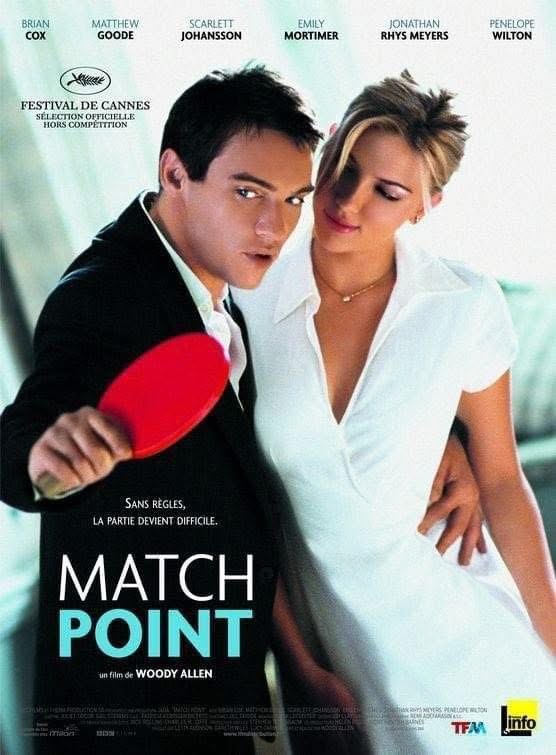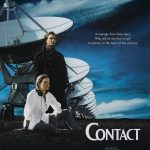Match point (2005)

Woody Allen’s Match Point is a haunting exploration of ambition, morality, and the role of chance in shaping human lives. Released in 2005, this psychological drama marked a significant departure from Allen’s traditional New York-centric narratives, instead setting the story in London. With its gripping plot, morally complex characters, and incisive commentary on class and desire, the film stands as one of Allen’s most accomplished works of the 21st century.
Plot Overview
The story follows Chris Wilton (Jonathan Rhys Meyers), a former tennis pro who transitions into a new life as a tennis instructor for the wealthy elite. Chris befriends Tom Hewett (Matthew Goode), a charming young man from a privileged family, and quickly ingratiates himself into the world of wealth and sophistication. Through Tom, Chris meets and marries Chloe (Emily Mortimer), the sweet-natured daughter of a wealthy businessman.
Despite his ostensibly perfect life, Chris becomes entangled in a passionate affair with Nola Rice (Scarlett Johansson), Tom’s American fiancée. Nola, a struggling actress, represents both Chris’s desire for escape and a threat to his carefully constructed world. As their affair intensifies, Chris is forced to confront the limits of his ambition and the lengths he is willing to go to preserve his newfound status.
The tension builds to a shocking climax, where themes of morality, luck, and consequence collide in a chilling exploration of human nature.
Themes and Analysis
1. Ambition and Class Mobility
At its core, Match Point is a story about ambition and the desire for upward mobility. Chris’s journey from humble beginnings to the upper echelons of society is emblematic of the lengths individuals go to achieve success. Yet, the film critiques this pursuit by showing how ambition, unchecked by morality, can lead to devastating consequences.
2. The Role of Luck and Chance
The titular “match point” refers to the thin line between victory and defeat, a metaphor for the role of chance in life. The film repeatedly underscores how luck, rather than merit or morality, often dictates outcomes. This theme is encapsulated in the recurring imagery of a tennis ball teetering on the net, symbolizing the precariousness of Chris’s situation.
3. Moral Ambiguity and Human Nature
Allen crafts a protagonist who is both relatable and deeply flawed. Chris’s actions—motivated by fear, lust, and self-preservation—challenge the audience to grapple with questions of morality and justice. The film’s refusal to deliver easy answers or moral judgments makes it a compelling and unsettling watch.
4. Desire and Power Dynamics
The relationship between Chris and Nola highlights the destructive power of unchecked desire. Nola is simultaneously a victim of Chris’s ambition and an agent of chaos in his life. Their affair serves as a catalyst for the film’s exploration of power, manipulation, and betrayal.
Performances
Jonathan Rhys Meyers as Chris Wilton
Rhys Meyers delivers a captivating performance, embodying Chris’s charm, desperation, and cold calculation. His portrayal captures the complexity of a character torn between ambition and guilt, making him both compelling and repellent.
Scarlett Johansson as Nola Rice
Johansson is magnetic as Nola, infusing the character with vulnerability and sensuality. Her chemistry with Rhys Meyers drives much of the film’s tension, and her performance highlights Nola’s tragic trajectory as a woman caught in a dangerous game of love and deceit.
Emily Mortimer as Chloe Hewett
Mortimer brings warmth and sincerity to Chloe, whose devotion to Chris contrasts sharply with his duplicity. Her character serves as a poignant reminder of the collateral damage caused by Chris’s choices.
Supporting Cast
Matthew Goode and Brian Cox deliver strong performances as Tom and Mr. Hewett, respectively, adding depth to the film’s portrayal of privilege and class dynamics.
Direction and Cinematography
Woody Allen’s direction is meticulous, with every scene contributing to the film’s pervasive sense of tension and unease. The choice of London as a setting lends a fresh, cosmopolitan backdrop that complements the themes of wealth and class.
Cinematographer Remi Adefarasin captures the elegance of the Hewett family’s world with a crisp, polished aesthetic, juxtaposed with the darker, grittier tones of Chris and Nola’s illicit relationship. The use of natural light and muted color palettes enhances the film’s realism and psychological depth.
Reception and Legacy
Match Point was a critical and commercial success, earning Allen an Academy Award nomination for Best Original Screenplay. Critics praised its sharp storytelling, moral complexity, and departure from Allen’s comedic roots. Many compared it favorably to Crimes and Misdemeanors (1989), another of Allen’s explorations of guilt and moral ambiguity.
Over the years, Match Point has been celebrated as one of Allen’s finest dramas, a testament to his ability to craft compelling narratives that challenge audiences to confront uncomfortable truths about human nature.
Conclusion
Match Point is a masterfully crafted psychological drama that combines riveting storytelling with profound thematic exploration. Its exploration of ambition, desire, and the role of luck in shaping human lives resonates long after the credits roll. Anchored by stellar performances and Woody Allen’s deft direction, the film remains a chilling and thought-provoking examination of morality and consequence.
For those who appreciate morally complex narratives and suspenseful storytelling, Match Point is an essential viewing experience that stands as one of the most compelling films of its era.










